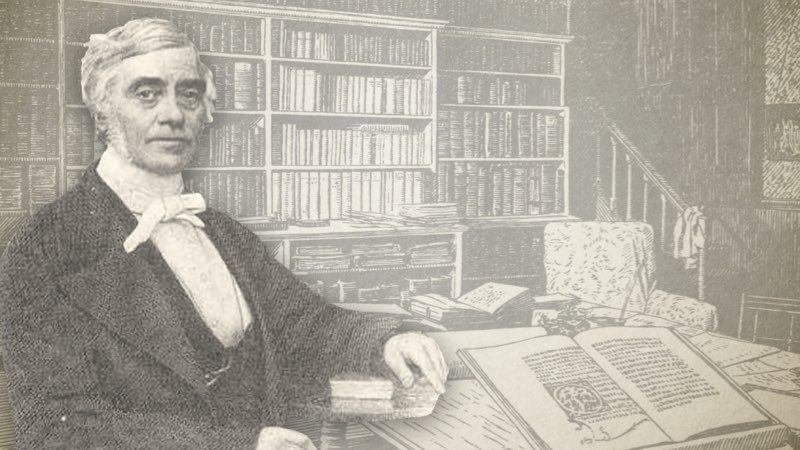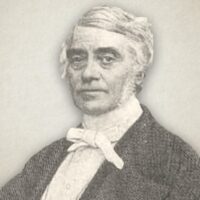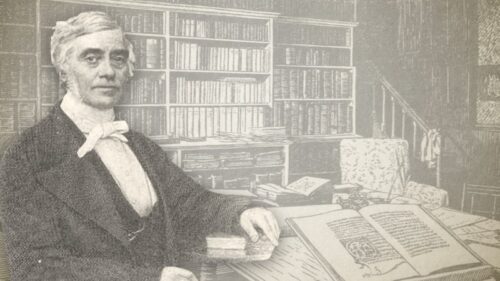
Overfamiliarity With The Gospel
November 17, 1831
My dear Mrs. Rackham,—Grace, mercy, and peace be multiplied unto you through the love of God our Father and Jesus Christ our Lord. I thank my God that the word which I preached among you did not return unto God void, but was accompanied with the power of the Spirit to the heart of some, and among them, I trust, to you also. This gives me confidence in writing to you, and I hope I shall be enabled to say something which may profit and comfort you. It grieves me to think that the sheep of Christ among you should not be walking in that light and comfort which is their portion and privilege. It has pleased our heavenly Father, who does all things in wisdom and love, to unfit me for that work which once I performed among you, and which it is my desire again to commence when it shall be His will. But why should you not still enjoy what you once enjoyed? Christ is the same, and His Spirit is the same, and the word of God is the same. I am afraid the children of God have been looking at times past too much to the instrument, and not been looking simply to Christ, that they might be filled out of the fullness that is laid up in Him. And, therefore, I trust God is teaching them this lesson, to cease from man, and to wait only upon Him.
My desire is to labor again in the vineyard where I labored in times past, and I trust in God’s good time I shall be allowed once more to go in and out among you. God has wonderfully restored my health since I left Stadham, though I am by no means so strong as I was before my illness, and am obliged to continue indoors when the weather is at all cold. Sir William Knighton discovered, I think, the cause of my illness under God, and said it arose entirely from over-exertion and exhaustion of the vital energy. By rest, through God’s mercy, it is recovering; and here, I think, we may see the good hand of God in afflicting me with illness at the time He did. If I had gone on as before, most likely when illness came my constitution would have sunk under it. I trust now, by resting some little time longer, I shall have recovered sufficiently to labor again in the vineyard of the Lord. By this dispensation also God may be teaching His children at Stadham, Chisleton, and Ascot to depend more simply on Him for His teaching.
We know what the children of Israel said in the wilderness (Num 21:5), “Our soul loaths this light bread,” and so, perhaps, where the children of God hear the sound of the Gospel so continually, they may become indifferent to it, and not receive it with that sweetness and power which they once did; and God has various ways of training up His children, and His ways are most wise, deep, and unsearchable. Jacob once said (Gen 42:36), “All these things are against me,” when those very things were working together for his good. But afterwards, when he saw his beloved son Joseph (Gen 46:30), he could say, “Now let me die, since I have seen your face, because you are yet alive”; and again (48:11), “I had not thought to see your face; and lo, God has showed me also your children.” And thus it is now; we cannot see the wisdom of God’s dealings at the time, but can afterwards look back and see (Ps 107:7), “He has led us forth by the right way, that we might go to a city of habitation.” “Those that sow in tears shall reap in joy.”
The advice which I would give to the children of God at Stadham, etc., is to search the Scriptures much for themselves, and be much in prayer for themselves and for each other. If they cannot derive that benefit which they would wish from their present minister, let them pray much for him, that God would teach him, and speak in him and by him to their souls. You may call to mind that when I left Stadham for a little while in May, 1830, the children of God were much in prayer that when I returned I might be enabled to preach more to their comfort and edification. I think they acknowledged at the time that the Lord, in a measure at least, heard their prayers. Let them now pray in the same way for their present minister, and the Lord will hear and answer. I really do not know where I could get a more satisfactory person. You all know how much trouble and anxiety it cost me, when Mr. T— left, to procure the aid of anyone even from Sunday to Sunday, and scarcely any except my dear friend Mr. G— preached to the edification of the saints. You should consider how much worse you might be off, and probably would be, should the Lord remove Dr. P—. I don’t mean, my dear Mrs. Rackham, when I say “you,” to admonish you in particular, but I speak to all the people of God who love to hear the sound of the Gospel. I believe that you love the truth, whoever preaches it, and desire to receive the engrafted word with meekness and humility.
In all your various trials, both personal and domestic, and what regards the Church of God, put in practice the command of the apostle, Phil 4:6. If you do this, you will find the promise in the seventh verse made good, “And the peace of God,” etc. Pray for yourself, for your family, for the children of God around you, for your present minister, for all saints (Eph 6:18), and for me also—that my health, if the Lord will, may be restored, and that I may come again to you, when I do come, “in the fullness of the blessing of the gospel of Christ” (Rom 15:29). Pray that I may come unto you with joy, by the will of God, and may with you be refreshed (Rom 15:32). Seek to be guided in all things by the Spirit; for “as many as are led by the Spirit of God, they are the sons of God.” Meditate upon Js 1:5; Jn 16:13-15; 14:13, 14; Lk 11:13; 18:1; Prov 2:3-6; 3:5, 6; Jer 29:11-13.
I could fill my letter with sweet and comfortable passages, as, indeed, the Word of God is full of comfort and instruction. “Only believe; all things are possible to him that believes.” If you are in trouble about temporal concerns, read over, and pray upon, Matt 6:25-34, and Jer 49:11, and ask the Lord for faith to believe and live upon these promises. The Lord seems to have helped you in inducing Mr. and Mrs. B.— to continue with you. The Lord, in sending bread, does not promise there shall be no trials and crosses with it. The bread is to be eaten in the sweat of the face (Gen 3:19), and so those that do not labor bodily for it must often labor for it in their mind. We are obliged sometimes to “eat our bread by weight and with care” (Ez 4:16); but, if God wills, our countenances, if we eat only vegetables, “may appear fairer and fatter in flesh than all the children which did eat of the portion of the king’s food” (Dan 1:12, 15).
With respect to placing E— with Mrs. W—, I would have you do what you think right in your conscience. Do not for temporal advantages do anything which you think might hurt her soul. But I am not sufficiently acquainted with all the circumstances to give my advice. Seek the will of God in the matter, and act as you think right in His sight, without regard to man.
Remember me very kindly to your nieces, the Miss R—s. I trust they are cleaving to the Lord through evil report and good report, and glorifying their Savior in their life and conversation, separating themselves in heart and spirit from the world. The greatest kindness that you could do them is to tell them where they are wrong, if you see anything of that kind in them. “In many things,” you know, “we all offend.” Give my Christian love also to Mrs. L—, and tell her to look to Jesus for strength in all things; and let her light shine in that wicked neighborhood where she dwells, that they may take knowledge of her that she has been with Jesus. Remember me also very affectionately to Mrs. L— and Sally N—, and bid them watch over their hearts and tongues where they live, that they may not speak unadvisedly with their lips. May the Lord comfort and teach them, and make them shine as lights in the world. Give my Christian love also to Sally and Nanny H—. I trust the Lord is with them, to comfort them, and to say unto their souls, “I am your salvation.”
Your mind may, perhaps, be troubled by what you hear from Oxford about Mr. Bulteel’s change of views. Let not that trouble you. You know what truth God formerly blessed to your soul; hold it fast. Remember you are a poor sinner who can only be saved by Jesus, and that the promise is given to those that believe in Him, that they shall be saved. Cleave simply to this, that His blood cleanses from all sin, and let nothing drive you from that. Avoid all questions and strifes of words, and look simply to Him that died on Calvary, and is now risen again to make intercession for His people, and to appear a second time for their salvation. I trust I do not forget any of the children of God, though I may not now mention them. I have spoken to you of those whom you chiefly know; but I send my love to all.
Believe me to be, Yours in true affection, J. C. P.
Joseph Philpot (1802-1869) was a Strict and Particular Baptist preacher. In 1838 he was appointed the Pastor of the Churches at Oakham and Stamford, during which time he became acquainted with the Gospel Standard. In 1849, he was appointed the Editor for the Gospel Standard Magazine, a position he held for twenty-nine years (nine years as joint Editor and twenty years as sole Editor). John Hazelton wrote of him—
“A man of great grace, profound learning, and with a literary style equal to any of his contemporaries. For twenty years he was editor of the "Gospel Standard," in which his New Year's Addresses, Meditations, Reviews, and Answers to Correspondents were outstanding features. His ten volumes of sermons, entitled "The Gospel Pulpit," and his four volumes of "Early Sermons," testify to his powers as an expositor of the Word, to the beauty of his illustrations, and the heart-searching character of his ministry. He was born at Ripple, Kent, where his father was rector, and educated at Merchant Taylor's and St. Paul's schools, entering at Oxford University in 1821, taking a first-class, and ultimately becoming Fellow of his College. He accepted an engagement in Ireland as a private tutor, but prior to his departure he was unexpectedly detained at Oakham. There he bought a book, "Hart's Hymns," and was much struck by the beauty of many of them. In 1827, in Ireland, eternal things were first laid upon his mind, and "I was made to know myself as a poor lost sinner, and a spirit of grace and supplication poured out upon my soul." He returned to Oxford in the autumn, and "the change in my character, life, and conduct was so marked that everyone took notice of it." Early in 1828 he was appointed to the perpetual curacy of Chislehampton, with Stadhampton—or Stadham—not far from Oxford. He soon gained the love and esteem of his parishioners. His Church was thronged, and his labours were unceasing amongst young and old. In 1829 he became acquainted with William Tiptaft (1803-1864), vicar of Sutton Courtney, and a friendship commenced which death alone severed. Both ministers had been led to know the truths of predestination and election and the final perseverance of the saints, and preached them with unflinching boldness. Persecution soon arose; it always does in some quarter when there is a faithful ministry. In 1831 Tiptaft built a chapel at Abingdon, where he remained as a Baptist pastor until his death. In 1835 Mr. Philpot resigned his living and his fellowship; the temporal sacrifice entailed was such that he had to sell almost all his books. Soon after this momentous step had been taken he preached in a chapel at Newbury, which some of his friends had procured for the purpose. He writes: "When I therefore began to open up that God had a chosen and peculiar people the whole place seemed in commotion. One man called aloud, 'This doctrine won't do for me!' and started out, and was instantly followed by five or six others. I was not, however, daunted by this, but went on to state the truth with such measure of boldness and faithfulness as was given me. Some of my friends at the chapel thought that the people would have molested me, but no one offered to injure me by word or action, and I came safe out from among them." He also writes: “——is, I fear, something like the robin spoken of in 'Pilgrim's Progress, who can eat sometimes grains of wheat and sometimes worms and spiders. I am quite sick of modern religion; it is such a mixture, such a medley, such a compromise. I find much, indeed, of this religion in my own heart, for it suits the flesh well; but I would not have it so, and grieve it should be so." He preached much at Allington, near Devizes, and in the Metropolis, and many other places. His ministry was attended by crowds, and was blest to saint and sinner. In 1838 he became Pastor of the Churches at Oakham and Stamford, residing in the latter town till failing health caused his removal to Croydon. At the time of his settlement at Stamford he became associated with the "Gospel Standard," and in 1849 he was appointed editor. He was a most interesting writer on the things of God. His sermons are experimental rather than doctrinal, but when he treated of doctrine it was in a comprehensive and scriptural way, as his "Meditations" amply prove. His book on "The Eternal Sonship" practically closed the controversy which gave it birth. His "Reviews" are most instructive and brilliantly written. Would that the younger members of our Churches made a study of them! "The Advance of Popery" was another work which had a wide circulation, and events today prove the accuracy of the forecasts so solemnly made therein. His "Letters" have been a means of grace to many, and it is refreshing through them to know the spiritual history of some of the excellent of the earth in their day and generation, and to have glimpses of services at Eden Street, Gower Street, and Great Alie Street Chapels, and at Came and other places, especially in Wiltshire.”
Joseph Philpot's Letters
Joseph Philpot's Sermons




